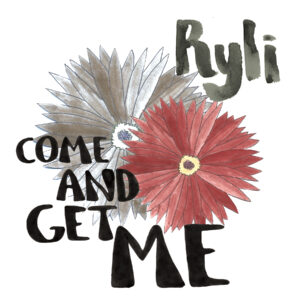
Artist
Ryli
Dandy Boy Records
Bay Area indie group Ryli’s new album, Come and Get Me, is fueled by friendship and a love of classic pop songwriting. Led by vocalist Yea-Ming Chen (Yea-Ming & the Rumours) and guitarist Rob Good (The Goods), and buoyed by the rhythm section of Luke Robbins (Yea-Ming & The Rumours, R.E. Seraphin) and Ian McBrayer (ex-Healing Potpourri), Ryli has earned a reputation as a formidable live act. On Come and Get Me, however, they prove they are just as comfortable flexing their skills in the studio.
Engineered and produced by Good at his Oakland studio, Come and Get Me came together swiftly and organically. “From the start, everything fell together really naturally,” Good says of the creative process. Ryli started as a one-off recording project between Chen and Good, but quickly turned into a full-fledged band when Robbins and McBrayer joined. The group immediately recognized their natural chemistry and capitalized on the opportunity, tracking the album within a few months.
Following close on the heels of their 2024 single, “I Think I Need You Around,” Ryli delivers a fully-formed pop record that touches on the familiar but goes beyond pastiche. So, while they cite “early McCartney, The Smiths, Camera Obscura, and Belle & Sebastian” as sources of inspiration, Chen and Good are veteran songwriters who can synthesize their influences and create a sound unmistakably their own.
That doesn’t mean Ryli is the Chen and Good show. “The collaborative effort is very much felt,” says Chen, who adds that all arrangements are done by committee. Of particular note are the contributions by Robbins and McBrayer, who add nervy, post-punk rhythms that challenge yet complement Chen and Good’s pop songwriting inclinations.
Lead single “Medicine Speed” is signature Ryli, featuring sunshiney melodies and jangly guitars, with a galloping rhythm section that belies the trepidation in the lyrics. According to Chen, “Medicine Speed” was written “in a moment of insomnia at 3am when it felt as if there was a scary thing around every corner of my room.” Meanwhile, “Break” is a propulsive minor key rocker showcasing Good’s blistering guitar work and hymn-like harmonies. But Chen’s contralto vocals give the song its gravity. “If I asked you to, would you break me out of here?” she asks mournfully on the chorus, but the question is purely rhetorical. She sings fully aware no one is coming to her rescue.
This high-wire balancing act between musical brightness and lyrical darkness, between effervescent melodies and muscular rhythms, makes Come and Get Me seem more like the work of a band in its prime than the debut of a group barely a year into its existence. But the album wouldn’t work if it was built simply on technical ability – Ryli are clearly a band relishing their time together and making the most of it. Despite the popular belief that misery makes great art, Ryli makes a convincing case that the joy of creating is crucial to the joy of listening.



